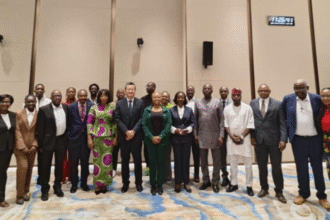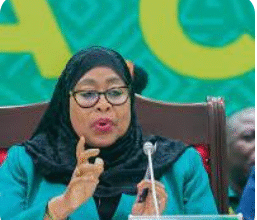By Simba Munyua
Dar es Salaam, Tanzania – The Tanzanian government, led by President Samia Suluhu Hassan, has blocked access to social media platform X, formerly known as Twitter, citing concerns over pornography and violation of online “ethics guidelines.” The move is raising alarm among human rights groups, who accuse the government of increasingly repressive tactics ahead of upcoming elections.
According to Minister of Information, Communication and Information Technology, Nape Nnauye Silaa, the ban stems from X’s decision last year to allow “consensually produced and distributed” adult content. He stated that X had “permitted explicit sexual material, including same-sex pornographic content,” violating Tanzanian law.
“Even on YouTube, you might notice that some content is inaccessible. That’s part of our broader effort to protect consumers and ensure that all online platforms operating in our country comply with our laws,” Silaa said in a recent interview.
This is not the first time Tanzania has restricted access to social media platforms. The Legal and Human Rights Centre (LHRC) pointed out that X faced a similar shutdown prior to the 2020 elections. They also noted that popular apps Clubhouse and Telegram are currently inaccessible without using VPNs.
“This recurrence of restrictions raises serious concerns about the openness of digital space in Tanzania,” the LHRC stated, adding that the government’s continued use of X by officials and public institutions while simultaneously blocking it creates confusion and undermines the government’s credibility.
The X block, first reported by internet watchdog Netblocks on May 20th, followed reports that the official police account had been hacked, displaying pornographic material and falsely claiming the president had died. Similar content appeared on the hacked YouTube account of the tax authority, according to AFP.
The shutdown and alleged hacking coincide with a government crackdown on human rights activists. Kenyan former Justice Minister Martha Karua was deported after arriving in Dar es Salaam to support opposition leader Tundu Lissu, who faces treason charges after calling for an election boycott if key reforms are not implemented.
Furthermore, reports have emerged of alleged torture and sexual assault of human rights activists detained after arriving in Tanzania to show solidarity with Lissu. Kenyan activist Boniface Mwangi and Ugandan activist Agather Atuhaire have both publicly stated they were subjected to degrading treatment while in detention. While Dar es Salaam’s police chief denied the allegations, regional rights groups, including Amnesty International, have called for a thorough investigation.
President Samia has defended her government’s actions, stating that Tanzania will not tolerate foreign activists “meddling” in the country’s affairs and causing “chaos.”
While President Samia initially received praise for allowing greater political freedom after succeeding the late President John Magufuli in 2021, critics argue she is now exhibiting similar authoritarian tendencies as she prepares to run in her first election as the ruling party’s presidential candidate.
The Tanzanian government maintains that the upcoming election will be free and fair, and that the country is a stable democracy. However, the recent crackdown on social media, human rights activists, and the opposition raises serious concerns about the future of political freedom and expression in Tanzania.









